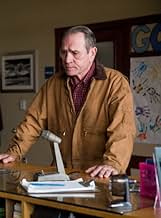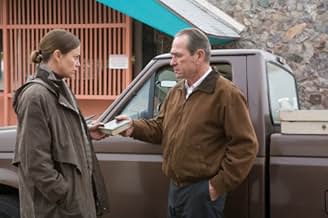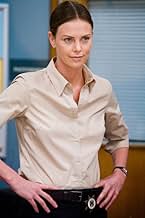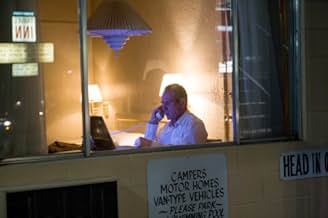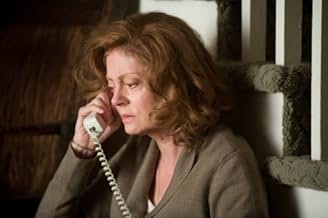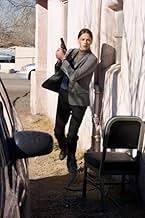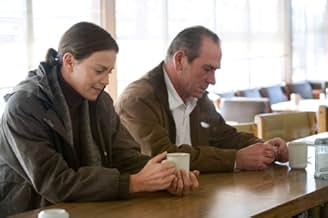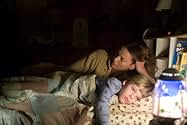CALIFICACIÓN DE IMDb
7.1/10
77 k
TU CALIFICACIÓN
Un investigador militar jubilado trabaja con un detective de policía para descubrir la verdad tras la desaparición de su hijo después de que regresara de la guerra de Iraq.Un investigador militar jubilado trabaja con un detective de policía para descubrir la verdad tras la desaparición de su hijo después de que regresara de la guerra de Iraq.Un investigador militar jubilado trabaja con un detective de policía para descubrir la verdad tras la desaparición de su hijo después de que regresara de la guerra de Iraq.
- Dirección
- Guionistas
- Elenco
- Nominado a 1 premio Óscar
- 3 premios ganados y 21 nominaciones en total
Roman Arabia
- Private Robert Ortiez
- (as Victor Wolf)
Greg Serano
- Detective Manny Nunez
- (as Greg Serrano)
Opiniones destacadas
Released in 2007 and directed & written by Paul Haggis, "In the Valley of Elah" is a crime drama/mystery inspired by the real-life case of Richard T. Davis. The story revolves around an elderly Tennessee couple (Tommy Lee Jones & Susan Sarandon) who get word that their son has gone missing from his base in New Mexico shortly after his return from Iraq. A retired military investigator, Hank Deerfield (Jones) goes to the base to find out the awful truth. Charlize Theron plays the civilian detective near the base who tries to help Hank while Jason Patric plays the Army counterpart. Josh Brolin is on hand as the town police chief.
This is a slow-burn mystery highlighted by great acting by the principles, especially Jones, and a thoroughly realistic story, which isn't surprising seeing as how it's based on true events. Speaking of which, I was surprised to find out that the basic details of the story are all accurate. The actual events took place in the Fort Benning area of Georgia rather than the fictitious Fort Rudd, NM.
The movie's not anti-Iraq War, but rather anti-PTSD; it merely reveals the awful truth about war in general: When we send our young men off to far-off lands where brutal warfare is normal they can bring that desensitized mentality back with them where the barbaric behavior that might be acceptable in war is anything but normal or conducive to a successful life, to say the least. Add the idiocy of alcohol abuse to the mix of PTSD and the results almost certainly WON'T be good.
The title refers to the valley where David, as a teen, fought and defeated the utterly intimidating Goliath from 1 Samuel 17.
ADDITIONAL ACTORS: James Franco, Wes Chatham, Jake McLaughlin, Mehcad Brooks and Roman Arabia play soldiers who knew Deerfield's son while Frances Fisher has a curious cameo (you'll know what I mean).
The film runs 121 minutes and was shot in Whiteville, Tennessee, and Albuquerque, New Mexico, with Morocco substituting for Iraq.
GRADE: B
This is a slow-burn mystery highlighted by great acting by the principles, especially Jones, and a thoroughly realistic story, which isn't surprising seeing as how it's based on true events. Speaking of which, I was surprised to find out that the basic details of the story are all accurate. The actual events took place in the Fort Benning area of Georgia rather than the fictitious Fort Rudd, NM.
The movie's not anti-Iraq War, but rather anti-PTSD; it merely reveals the awful truth about war in general: When we send our young men off to far-off lands where brutal warfare is normal they can bring that desensitized mentality back with them where the barbaric behavior that might be acceptable in war is anything but normal or conducive to a successful life, to say the least. Add the idiocy of alcohol abuse to the mix of PTSD and the results almost certainly WON'T be good.
The title refers to the valley where David, as a teen, fought and defeated the utterly intimidating Goliath from 1 Samuel 17.
ADDITIONAL ACTORS: James Franco, Wes Chatham, Jake McLaughlin, Mehcad Brooks and Roman Arabia play soldiers who knew Deerfield's son while Frances Fisher has a curious cameo (you'll know what I mean).
The film runs 121 minutes and was shot in Whiteville, Tennessee, and Albuquerque, New Mexico, with Morocco substituting for Iraq.
GRADE: B
I just saw this film and consider it to be one of the best anti-war films I've seen in quite a long time. And that makes me wonder at what the various critics are thinking. Roger Ebert gets it right, but some film critics are far too dismissive of a very serious, important film. James Berardinelli, in particular, seems curiously _angry_ that this film depicts the moral degradation of war in a frank and honest fashion.
Berardinelli is basically wrong in every single thing he says about the film. Since this film is not a "politcal message" film, it has no requirement to "show both sides equally". It is a story about a group of soldiers basically driven beyond the area of traditionally human behavior. Berardinelli thinks that it's "obvious" that war changes the way people feel about their country.
I sense a person utterly detached from history when I read that. A recent study concluded that the English were, as a group, fairly happy during WWII, even when their nation was under attack. Why was that? Because they believed in what they were doing. The notion that war _necessarily_ results in moral breakdown is, while hardly novel, also not true. That is part of what is important about "Elah". Jones' character is a veteran of the Vietnam war, and is hardly a delicate flower when it comes to the matters of war and its effect on the psyche. And yet even he is floored at what the Iraq war has done to the soldiers.
It is easy for a film critic to simply reject what is essentially reporting on the state of the military today. That Berardinelli does so with such vitriol makes me guess that he is injecting his own bias into the review.
Berardinelli is basically wrong in every single thing he says about the film. Since this film is not a "politcal message" film, it has no requirement to "show both sides equally". It is a story about a group of soldiers basically driven beyond the area of traditionally human behavior. Berardinelli thinks that it's "obvious" that war changes the way people feel about their country.
I sense a person utterly detached from history when I read that. A recent study concluded that the English were, as a group, fairly happy during WWII, even when their nation was under attack. Why was that? Because they believed in what they were doing. The notion that war _necessarily_ results in moral breakdown is, while hardly novel, also not true. That is part of what is important about "Elah". Jones' character is a veteran of the Vietnam war, and is hardly a delicate flower when it comes to the matters of war and its effect on the psyche. And yet even he is floored at what the Iraq war has done to the soldiers.
It is easy for a film critic to simply reject what is essentially reporting on the state of the military today. That Berardinelli does so with such vitriol makes me guess that he is injecting his own bias into the review.
Only Roger Ebert and the reviewer for Rolling Stone seem to see the truth here: this film is slow and elegiac because it deals with heavy matters, but it is never boring, not if you understand the situation and the depth of feelings being explored. It's as if reviewers don't get it because they didn't really feel what the film is saying. Saying that there have been dozens of films about how war ruins men so it's a cliché, and that this one is too dreary and slow means that a person has stopped feeling for what is really hurtful, is even in denial. And that's the theme of this film: what happens when we lose touch with what's painful and don't care any more. The film is restrained but powerful, which is why it has such a strong effect.
Jones is wonderfully grim, with a face like a road map, as he explores what happened to his son. Charlize Theron is beautiful even though she is playing a woman who is forced to act as non-sexy as possible to get on in her job in a male police force. Susan Sarandon is not, as some critic said, "underused"; she gives a performance that is all the more powerful because it is restrained. This movie should be a must see for all who believe that the Iraq war should continue until there is an honorable time for America to leave. That time is already passed.
Jones is wonderfully grim, with a face like a road map, as he explores what happened to his son. Charlize Theron is beautiful even though she is playing a woman who is forced to act as non-sexy as possible to get on in her job in a male police force. Susan Sarandon is not, as some critic said, "underused"; she gives a performance that is all the more powerful because it is restrained. This movie should be a must see for all who believe that the Iraq war should continue until there is an honorable time for America to leave. That time is already passed.
There are many people out there who hate the way Paul Haggis made his directorial debut, "Crash," an overly soapy and stupidly-tied-together drama (at least, that's what it felt like to them). Those people don't have to worry. His second major directorial outing, "In the Valley of Elah," avoids both of the "mistakes" (although I'd hardly call them that, seeing as he won Best Picture for what he did with "Crash") that he made last time around. Instead of mixing together multiple stories and having them all connect at the very end, this movie revolves around one main story, a story that seems a lot like the modern-day war version of "Chinatown." Instead of going for simple emotional tugs that he did with "Crash," this film focuses on its understated performances, namely from Tommy Lee Jones, who is superb in this film. It is truly courageous of Paul Haggis to be willing to make some serious changes to the style that won him a Best Picture Academy Award, and even more impressive that he pulls it off very well.
The story revolves around an ex-military officer, Hank Deerfield, who is told that his son, a soldier returning home from Iraq, has gone missing. Jones plays the character in such a quiet way that makes you feel like he thinks he shouldn't be showing emotion, but has a lot of it bottled up inside of him. When he arrives at the military station, people don't seem to want to tell him what happened, and say that they expect he'll come to the base anytime soon (this is portrayed especially well by James Franco, who you may know as Harry Osbourne from the "Spider-man" movies).
Refusing to believe that it's as simple as that, Deerfield is relentless in getting information out of people as to what really happened. It's the way he functioned in the army, and it benefits him greatly as he has to get any information he can out of people. Enter Detective Emily Sanders (played by a very strong Charlize Theron), who at first just wants to get through her job for the day, but soon gets wrapped up in also discovering what really happened to Deerfield's son. The two of them have great chemistry together, as their two different personalities give two different perspectives on what's happening.
The movie works because although it does have quite a few negative things to say about the current war in Iraq, the entire film isn't a two-hour tirade against it. It only makes that message part of the story, and does it in subtle ways (aka the soldiers don't just go "War...it...destroys...you..." but take a lot more time expressing their emotion). Much of the story works like a mixture between the great film "Chinatown" and a much better-acted, better-written version of a really good episode of "CSI." Although there may be a few too many twists and lies circling about, it comes to its conclusion very well in a satisfying way for the audience.
Paul Haggis has an uncanny way of bringing out great performances from all of his actors. The performance of Tommy Lee Jones could be the best of his career, he brings out a much more emotionally quiet side in Charlize Theron than we've before seen, the short performance of Susan Sarandon is particularly powerful, and all of the soldiers are played with a feeling of sincerity. The acting is probably the strongest element of the film, and if there's any "weak part," it would have to be the way Haggis forced out some of the plot twists to make the film as long as he wanted it to be.
Regardless of its few problems, "In the Valley of Elah" is both a very well-mannered look at the war in Iraq and its effects on the people involved, as well as a very interesting crime thriller. At the heart of it is Haggis's quietly powerful directing style and the cast's powerfully quiet performances. I don't see this picking up a Best Picture nomination as Haggis's past three Oscar hopeful screenplays ("Letters from Iwo Jima," "Crash," and "Million Dollar Baby"), but I would not be surprised to see it pick up a few acting nominations as well as possibly a screenplay nod. If it does...it would have definitely earned it.
The story revolves around an ex-military officer, Hank Deerfield, who is told that his son, a soldier returning home from Iraq, has gone missing. Jones plays the character in such a quiet way that makes you feel like he thinks he shouldn't be showing emotion, but has a lot of it bottled up inside of him. When he arrives at the military station, people don't seem to want to tell him what happened, and say that they expect he'll come to the base anytime soon (this is portrayed especially well by James Franco, who you may know as Harry Osbourne from the "Spider-man" movies).
Refusing to believe that it's as simple as that, Deerfield is relentless in getting information out of people as to what really happened. It's the way he functioned in the army, and it benefits him greatly as he has to get any information he can out of people. Enter Detective Emily Sanders (played by a very strong Charlize Theron), who at first just wants to get through her job for the day, but soon gets wrapped up in also discovering what really happened to Deerfield's son. The two of them have great chemistry together, as their two different personalities give two different perspectives on what's happening.
The movie works because although it does have quite a few negative things to say about the current war in Iraq, the entire film isn't a two-hour tirade against it. It only makes that message part of the story, and does it in subtle ways (aka the soldiers don't just go "War...it...destroys...you..." but take a lot more time expressing their emotion). Much of the story works like a mixture between the great film "Chinatown" and a much better-acted, better-written version of a really good episode of "CSI." Although there may be a few too many twists and lies circling about, it comes to its conclusion very well in a satisfying way for the audience.
Paul Haggis has an uncanny way of bringing out great performances from all of his actors. The performance of Tommy Lee Jones could be the best of his career, he brings out a much more emotionally quiet side in Charlize Theron than we've before seen, the short performance of Susan Sarandon is particularly powerful, and all of the soldiers are played with a feeling of sincerity. The acting is probably the strongest element of the film, and if there's any "weak part," it would have to be the way Haggis forced out some of the plot twists to make the film as long as he wanted it to be.
Regardless of its few problems, "In the Valley of Elah" is both a very well-mannered look at the war in Iraq and its effects on the people involved, as well as a very interesting crime thriller. At the heart of it is Haggis's quietly powerful directing style and the cast's powerfully quiet performances. I don't see this picking up a Best Picture nomination as Haggis's past three Oscar hopeful screenplays ("Letters from Iwo Jima," "Crash," and "Million Dollar Baby"), but I would not be surprised to see it pick up a few acting nominations as well as possibly a screenplay nod. If it does...it would have definitely earned it.
'War is hell' but perhaps it is the postwar that is most telling. At least that is the thesis of Paul Haggis' latest film, In the Valley of Elah, a story of a father's quest for his son that reveals some bitter truths about war. Not an easy film to swallow upfront, it is certainly one of the best films of the year.
A grizzled, former military policeman, Hank Deerfield (Tommy Lee Jones), is notified that his son, Mike, is AWOL after returning from the fighting in Iraq. What begins as a methodical search for his son's whereabouts becomes more tragic and clashes with local police and military brass. Where is his son, and what do his soldier buddies know about one fateful night near their base? And what if anything did happen to him in Iraq? These questions are answered in small pieces and with alarming implications. Hank's skills at police work help convince local Detective Emily Sanders (Charlize Theron) to take charge of the case despite the doubts of her own colleagues and the military, led by investigator Lt. Kirklander (Jason Patric). Mike's PDA has garbled video that begins to paint a disturbing picture of the war front. Hank's search takes an emotional toll on himself and his wife (Susan Sarandon). He and Emily form an uneasy alliance, and, amid theories and suspects, what emerges is an ominous portrait of war veterans on the homefront. Ultimately Hank comes face to face with a disarming truth about his son's fate and the possible involvement of his military brethren.
The story is based on actual events in 2001 in Tennessee, and its title references the mythic tale of David and Goliath set at a time when the rules of engagement were different than the present. Its sparse, simplistic structure of a mystery peppered with flashback video and imagery may seem on surface like an independent film, but its message and execution is on a grander scale and not merely with dialogue. With effective visuals, much is conveyed by silence, expression, or simple body language.
As with other Haggis films, things that seem ordinary and insignificant at the beginning have implications later on. Though not as overtly obvious with connecting a myriad of dots as in his Oscar winner Crash, the threads are all there to gradually weave together. It is refreshing that the jurisdictional conflict between local police and the military does not take a stereotypic turn of heavy handed conspiracy and cover-up even though the military investigators are not cast in the best light. It shares a similar feel with the recent Courage Under Fire where the truth is unearthed in small bits until a bigger picture emerges. A couple of minor plot points go nowhere such as Hank meeting an old comrade who may have connections with military intelligence.
As grandiose and flamboyant as was his Oscarwinning turn in The Fugitive, Tommy Lee Jones' acting here is equally underplayed; he is magnificent. Through the pain and guilt that creep over his lined features, you also feel his suffering, his loss, and understand his bitterness. His Hank is a proud man, a patriot, who wants the truth. The truth ultimately changes him forever. Equally up to the challenge is Theron, in a strong performance, whose detective is a single mother who must battle her own squad and superiors while trying to solve a mystery. Even Sarandon's brief moments are affecting as the long distance wife. The rest of the cast is very good; they become real people.
This is not simply the readjustment to the homefront done magnificently in The Best Years of Our Lives or the heavy use of dramatic love triangle to condemn the Vietnam War in Coming Home. Rather, it takes the concept of a given war and allows it to become the ultimate villain in an increasingly sordid mystery. Its ending calls to mind The Deer Hunter but with a more pessimistic bent. It most certainly vilifies the effects of war on its men.
It is significant that a passing quote, "We all do stupid things," says something about not just the horror of warfare, but what such conflict does to its soldiers, and how they become soulless monsters capable of the most brutal of crimes. This is a brave, imperfect film that sets a somber tone and never lets up. The final image is a statement that makes this perhaps the subtlest of antiwar films ever. Oscar nominations can start here with picture, direction, screenplay, and the duo of Jones and Theron. While not everyone will be willing to let the story unfold with its nuanced direction and understated acting, those who are patient will find a moving tale of innocence lost and corrupted.
A grizzled, former military policeman, Hank Deerfield (Tommy Lee Jones), is notified that his son, Mike, is AWOL after returning from the fighting in Iraq. What begins as a methodical search for his son's whereabouts becomes more tragic and clashes with local police and military brass. Where is his son, and what do his soldier buddies know about one fateful night near their base? And what if anything did happen to him in Iraq? These questions are answered in small pieces and with alarming implications. Hank's skills at police work help convince local Detective Emily Sanders (Charlize Theron) to take charge of the case despite the doubts of her own colleagues and the military, led by investigator Lt. Kirklander (Jason Patric). Mike's PDA has garbled video that begins to paint a disturbing picture of the war front. Hank's search takes an emotional toll on himself and his wife (Susan Sarandon). He and Emily form an uneasy alliance, and, amid theories and suspects, what emerges is an ominous portrait of war veterans on the homefront. Ultimately Hank comes face to face with a disarming truth about his son's fate and the possible involvement of his military brethren.
The story is based on actual events in 2001 in Tennessee, and its title references the mythic tale of David and Goliath set at a time when the rules of engagement were different than the present. Its sparse, simplistic structure of a mystery peppered with flashback video and imagery may seem on surface like an independent film, but its message and execution is on a grander scale and not merely with dialogue. With effective visuals, much is conveyed by silence, expression, or simple body language.
As with other Haggis films, things that seem ordinary and insignificant at the beginning have implications later on. Though not as overtly obvious with connecting a myriad of dots as in his Oscar winner Crash, the threads are all there to gradually weave together. It is refreshing that the jurisdictional conflict between local police and the military does not take a stereotypic turn of heavy handed conspiracy and cover-up even though the military investigators are not cast in the best light. It shares a similar feel with the recent Courage Under Fire where the truth is unearthed in small bits until a bigger picture emerges. A couple of minor plot points go nowhere such as Hank meeting an old comrade who may have connections with military intelligence.
As grandiose and flamboyant as was his Oscarwinning turn in The Fugitive, Tommy Lee Jones' acting here is equally underplayed; he is magnificent. Through the pain and guilt that creep over his lined features, you also feel his suffering, his loss, and understand his bitterness. His Hank is a proud man, a patriot, who wants the truth. The truth ultimately changes him forever. Equally up to the challenge is Theron, in a strong performance, whose detective is a single mother who must battle her own squad and superiors while trying to solve a mystery. Even Sarandon's brief moments are affecting as the long distance wife. The rest of the cast is very good; they become real people.
This is not simply the readjustment to the homefront done magnificently in The Best Years of Our Lives or the heavy use of dramatic love triangle to condemn the Vietnam War in Coming Home. Rather, it takes the concept of a given war and allows it to become the ultimate villain in an increasingly sordid mystery. Its ending calls to mind The Deer Hunter but with a more pessimistic bent. It most certainly vilifies the effects of war on its men.
It is significant that a passing quote, "We all do stupid things," says something about not just the horror of warfare, but what such conflict does to its soldiers, and how they become soulless monsters capable of the most brutal of crimes. This is a brave, imperfect film that sets a somber tone and never lets up. The final image is a statement that makes this perhaps the subtlest of antiwar films ever. Oscar nominations can start here with picture, direction, screenplay, and the duo of Jones and Theron. While not everyone will be willing to let the story unfold with its nuanced direction and understated acting, those who are patient will find a moving tale of innocence lost and corrupted.
¿Sabías que…?
- TriviaThis film was originally a potential starring vehicle for Clint Eastwood, who directed Paul Haggis' screenplay for Golpes del destino (2004). Eastwood turned it down, despite liking the script very much, and recommended his friend Tommy Lee Jones for the role of Hank Deerfield.
- ErroresThe opening subtitle says that the Deerfields live in "Munro, Tennessee", but the address on the side of Hank's truck says "Munroe, Tennessee".
- Citas
Chief Buchwald: But didn't you just say that you would do whatever you were told?
Det. Emily Sanders: Yeah, I sometimes exaggerate for effect.
- Bandas sonorasShu44le
Written by Robin Davey and Jesse Davey
Performed by The Davey Brothers
Courtesy of The Davey Brothers
Selecciones populares
Inicia sesión para calificar y agrega a la lista de videos para obtener recomendaciones personalizadas
- How long is In the Valley of Elah?Con tecnología de Alexa
Detalles
- Fecha de lanzamiento
- País de origen
- Sitios oficiales
- Idioma
- También se conoce como
- In the Valley of Elah
- Locaciones de filmación
- Productoras
- Ver más créditos de la compañía en IMDbPro
Taquilla
- Presupuesto
- USD 22,000,000 (estimado)
- Total en EE. UU. y Canadá
- USD 6,777,741
- Fin de semana de estreno en EE. UU. y Canadá
- USD 133,557
- 16 sep 2007
- Total a nivel mundial
- USD 29,541,790
- Tiempo de ejecución
- 2h 1min(121 min)
- Color
- Mezcla de sonido
- Relación de aspecto
- 2.35 : 1
Contribuir a esta página
Sugiere una edición o agrega el contenido que falta







